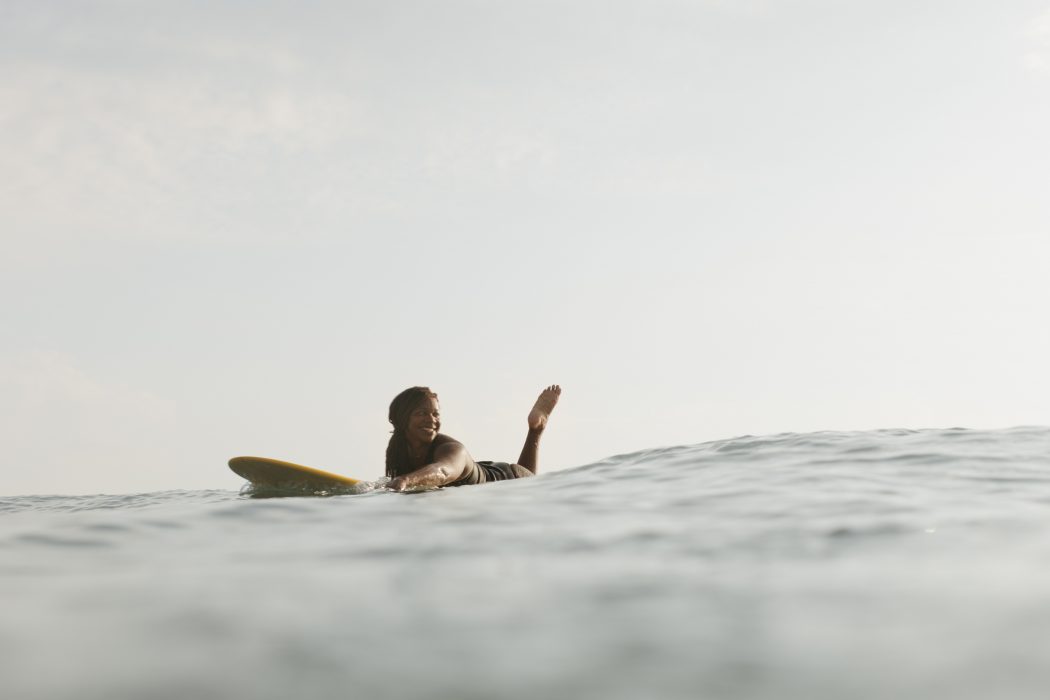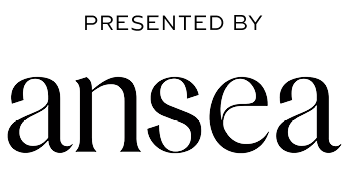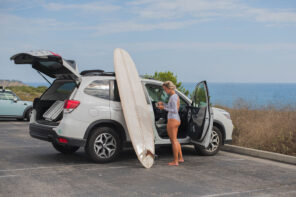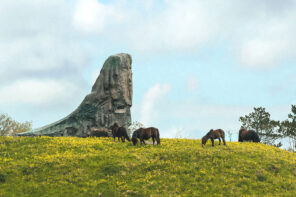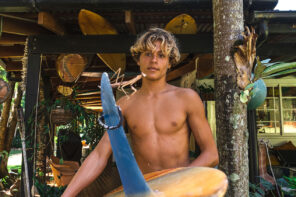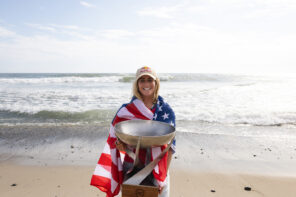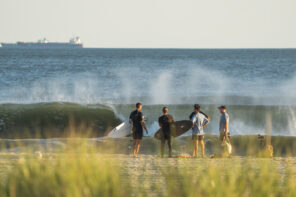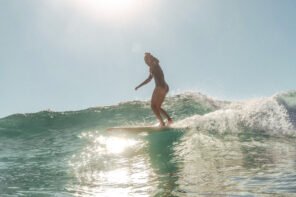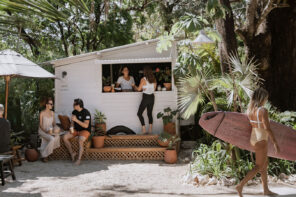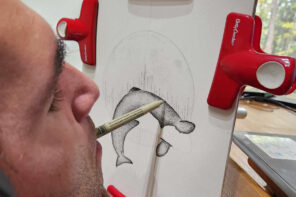GiGi Lucas is Bringing Equality to the Break
There’s not much better than when a person goes out of their way to make the world a better place for other people. These kinds of people deserve a medal and a nice bouquet of flowers. Especially, one particular friend of ours who founded SurfearNEGRA, in efforts to #diversifythelineup, bringing opportunity to kids and people of color to enjoy and embrace the ocean. Woman of the hour, GiGi Lucas.Located in Jacksonville Beach, FL, she founded her organization with a mission to bring gender and cultural diversity to the sport of surfing. Through her nonprofit, she has two programs, ¡100Girls! and ¡SURFTHETURF! These work to provide accessibility to surfing for kids who may not have had the opportunity before. Not only does GiGi want to share the physical sport of surfing, but also the passion and experience that come with it.
Working to make everyone feel comfortable and confident regardless of preexistent social standards, GiGi has worked to break down barriers that the break once had. The ocean is a place for everyone, no matter who they are, no matter where they come from. We sat down with GiGi to learn more about her efforts for equality, how doing what you love can change the world and when is the proper time for a bowl of Captain Crunch Peanut Butter Crunch.

Photography by Stefanie Keeler Photography | All swimwear courtesy of Ansea
You didn’t start surfing until age 35, did you always know you wanted to get on a board?
GiGi: So it’s funny. Even though I’ve seen surfing in its different iterations, like windsurfing and kite surfing, I never considered it to be an option for me until much later in life because I didn’t see anyone who looked like me doing it. It’s not that I didn’t know it existed, I just didn’t consider it.
Where did you find the courage to get in the water and learn to surf for the first time?
GiGi: When I was in my late twenties, I made this random bucket list. Well, more like, “I want to do these two things before I’m 40.” One was to play the piano and one was to learn how to surf. I still can’t play the piano, FYI. But I knew I wanted to surf. I wanted to learn. My old college roommate got married in Costa Rica, so when I was down there I took a surf lesson and that’s what got me into the water. And the first time I stood up on the wave it just kind of clicked and I was like, “Yep. This is it. This is what I want to do with my life.”

What does the water mean to you? Get deep.
GiGi: The water for me means fluidity. And not just fluidity in its chemical structure, it’s fluid. It reminds me that life is ever-changing. In a season of difficult times, it reminds me that you know what, just relax because it will change. Everything always changes. What the water and ocean mean to me is being able to navigate life in a way that is graceful, yet powerful and not static.
Favorite type of cereal?
GiGi: If I want to act like I’m being healthy, Kellogg’s Special K Vanilla Almond is my jam. But, if I’m feeling gluttonous and it’s 3 o’clock and I just want some cereal while I think, it’s Captain Crunch Peanut Butter Crunch. I have cereal for different moods. It’s the ultimate thinking food.
What was your motive to create SurfearNEGRA?
GiGi: The initial reason was that I didn’t see anyone who looked like me, from the United States, even attempting to surf. So the original idea started off creating a community where women of color could come together and share breaks and spots and locales. But, then I realized that there were already other people who were starting to do that same concept and so what I realized was that yeah, it’s great there are women that are starting to get into the sport, but then what? So I said, “What would prevent the next generation from doing this?” and I recognized the fact that there was an access issue, and in terms of seeing what was possible and then actually doing what was possible. I realized that there needed to be a bridge to help the next generation do what they saw.

How surfing can change a life?
GiGi: The thing with surfing is that it teaches you how to be present and still in a society that promotes hustle and grind. And what I’ve learned through surfing is you can actually accomplish the same, if not more, by being present and still than can when you are running on all cylinders. My illustration for this is always about the wave. If we are not present and still trust in the work that we have already put in to get to that point, we may actually miss this beautiful wave that has been created long before we got there, to come to us at that very moment. At this season in my life, things are flowing and I honestly believe that the reason why so much is happening is because I’m learning how to be present. Had I known that earlier in life, the skillset and discipline to be present, I feel like there would’ve been a lot more opportunity for me to relax in who I was and be comfortable in where I was and the work that I had already put in versus always feeling inadequate and not doing enough.
What is the most rewarding part of your mission?
GiGi: As much as I can, I’ll actually go to the surf camps that the girls are attending and talk to them and hear about their experience. So there were these two little girls, like 8 or 9 years old, and they were so excited that they were on these big waves. I asked them how big the waves were and without hesitation they were saying how they rode five-foot waves, going on and on. There’s no way they could have ridden five-foot waves, but, the fact that they had that memory and the fact that they were so confident in explaining their experience, you could tell there was this freedom that they had and they said it with confidence. That’s the thing I feel like a lot of girls, especially girls of color, don’t have when they are doing something outside of the norm.

Someone we should follow?
GiGi: My current infatuation is @MichaelaCoel. She is a British actress and she starred in this series on Netflix called Black Earth Rising. Just her presence is phenomenal, her visual image is incredible. She’s stunning for so many reasons, but her vision to tell these stories you probably would never hear about otherwise is super inspiring. People like that give me courage and they inspire me because if not us, then who is going to help tell this story.
How many girls has ¡100Girls! helped so far?
GiGi: This year was tough because of Covid, but to date, we have gotten 63 girls in the water over two summers.

Who is your biggest inspiration/role model and why?
GiGi: I have three. The first one is my mother. She is probably one of the most selfless people that you will ever encounter. She is so intuitive it’s almost scary. She can meet someone and automatically know what their deficiency or what their need is and then the crazy part is that she somehow can conjure up the words to comfort that person, she’s incredible that way.
The second is Serena Williams. Primarily because she operates in a space where she is in a sport that historically didn’t include people who look like her, but yet she has managed through hard work and discipline and even enduring the negative comments to still excel. She is an excellent example of what any athlete should be, not just a black woman, but any athlete.
This is going to sound really cliché, but Beyonce is my girl. It’s not her music, it’s her work ethic and her ability to bring to fruition these creative ways of communicating what she wants to say. It takes balls to be able to be in an industry that is not necessarily set up for her to succeed, and she still finds a way to tell her story regardless. In a way that compensates her accordingly, and I think that’s something we as women and we as black women don’t pay attention to when it comes to business. We bring this beauty and this talent and this contribution to the table, but yet we don’t realize the value of what it is and she does.
Why is Ansea a brand you choose to support?
GiGi: They were my aces out of the gate, man. They understood the importance of starting out of the gate with a diverse mentality about how to approach the marketplace. There are so many brands that just follow the mold in terms of who the target demographic is, but Ansea knew that all people are welcome. Everyone is welcome in the ocean, so creating that space of inclusion, right out of that gate, was so important for me. Especially when you’re talking about aquatic lifestyles like sailing and surfing. That’s when I knew this was a brand I could rock with. Then, the icing on the cake is they are sustainable fashion, they are very responsible in what they’re doing and they’re good people. I could go on honestly. They’re an East Coast brand and they are doing so many things that are contrary to the standard norm of this industry and I appreciate that.

What does ocean conservation mean to you?
GiGi: Ocean conservation is not just something you do sporadically, it’s part of who you are, but I think, in order to get to that point, you have to have a true relationship with it and one thing that I know for a fact is that the health and sustainability of our ocean is going to take a collective effort, not just an effort of a couple of social groups. So when I think about that, I realize there is an entire demographic, i.e. black people, who for many reasons, don’t have that relationship with the ocean. And so this is why I feel it is important for organizations like mine and brands like Ansea to really encourage the lifestyle so that we can nurture and develop the relationship across demographics that have been left out previously. At the end of the day, you take care of what you love. Bottom line.
Has the predominately white surf community been welcoming and supportive?
GiGi: Yes, for a couple of reasons. One has to do with who I am as a person and my personality and the time I took to learn the sport in the community and industry and adopt the etiquette of how the sport works and respect the players who have spent years doing it. So I think when you come to the table with that, people then, in turn, respect you and what we bring to the table. Also, I think the timing was right with everything, especially with the Black Lives Matter movement and just bringing awareness to the discrepancies in terms of who participates in the industry. But, I can say that in terms of sheer support, I still see a lot of privilege in terms of “if it’s not my problem, it’s not a problem. If it doesn’t directly affect me, then I’m not going above and beyond to help get rid of the issue.” So I do see there is a lack of true longterm engagement, but things like this take time and as we build momentum I think people will be more inclined to get engaged.
What is your mantra?
GiGi: This one comes from my dad, he always told me, and he still does every time I see him, he says, “Baby girl, don’t let anything or anybody steal your joy.” And if that’s not the truest thing. Every day when I get up I have to really think about the things I don’t even particularly like to do. I have to remember why I do it and it always has to be tied to bringing me joy and being supportive of me being joyful in some way, shape, or form. I have to make a concerted effort to carve out time to surf by myself because that is what started this whole journey and I have to remember and keep reminding myself of the joys therein so I can bring that forward in everything else I do.

What is your biggest dream?
GiGi: In a few years from now, when we describe someone, it is not a black girl who surfs, not a woman who surfs, but just look at that surfer. Period.
What does SurfearNEGRA mean to you?
GiGi: The name SurfearNEGRA means surfing while black. In South America and in Latin countries, the term “Negrita” means black girl. So when I think about the actual term, “surfing while black,” it’s actually a good thing. It’s a term of beauty and endearment and something that you have deference for and you love. So when I think about what SurfearNEGRA means to me it’s just that. Something that is beautiful for me to be able to see the opportunity for these young girls to experience something that is so beautiful.
What advice would you give to others in regards to stepping outside of their comfort zone?
GiGi: I’ve said this before, I’ll say it again, I’ll say it ‘til the day I die, “Get comfortable, being uncomfortable.” That’s life in general. I feel once you adopt that mentality, there are so many incredible things that happen in life when you don’t play it safe. So that’s it. Whether it’s going into a sport where no one looks like you, or going into the ocean and you haven’t had the most experience with it, just get comfortable being uncomfortable and enjoy the ride.

How does catching that wave make you feel? Is this part of what you want to share with the people you are helping?
GiGi: It’s pure elation. It’s not just about being free, it’s about knowing that there are ways for you to defy laws of physics and to do incredible things. And that concept in itself just reminds me of how many things are possible if we just live and allow it to happen. And that’s what surfing is. There are so many things that are contrary to the laws of nature, but if we just be still and allow certain things to happen, you can do incredible things. We can do incredible things.
This is what I want to share. Crazy things are possible. There is so much that we don’t know until we allow it to happen. That fear is what keeps us from doing so many things, but again, if we just get comfortable being uncomfortable, there are tremendous things that can happen in this life.
What are your plans for SurfearNEGRA in the future? Where do you hope to be in 5 years?
GiGi: The immediate future is ¡SURFTHETURF! So, our mission statement is to make surfing accessible for any kid anywhere and that includes those kids who are geographically challenged. Over the next few years, the goal would be to deploy and to grow the ¡SURFTHETURF! program which is an in school/ in-home program to teach kids the fundamentals of surfing and also to get them engaged in the sport. That’s the goal. To get people moving and to literally democratize the sport of surfing.

Was there a particular breaking point for you to make getting in the water easier for other girls and women of color?
GiGi: No, there wasn’t a breaking point. But, what did happen, was when I moved back from Costa Rica to the states and I landed here in Jacksonville, the importance of what I was doing became more and more apparent to me. The long-term effects of slavery and Jim Crow laws and The Civil Rights Movement literally broke the connection of our people with the ocean, so over the span of three years, I just became more aware of how important it is to do this.

